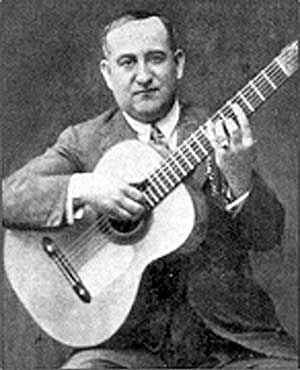


Ramon Montoya
Source: Shine Music School
Born a gypsy in Madrid on 2 November 1879, flamenco guitarist, Ramon Montoya, is credited w originating the quivering note in flamenco guitar that is called tremolo. Montoya happened along at just the right place and time when flamenco dancers (original element) and singers (added later) began sharing stage w guitar virtuosi, making percussion, voice and guitar the primary elements of flamenco, which needn't come with anything else but emotive skirts and castanets. Which appears deceptively simple since flamenco also comes with a myriad of forms and styles (palos) that will give you a complex if you need a spare. Montoya also made some of flamenco's earliest recordings as of 1909. Montoya didn't make flamenco guitar famous, but he prepared the path for his nephew, Carlos Montoya, who would. As dance (baile) was and will ever be the primary element of flamenco, with castanets and stamping of feet its only percussion, song (cante) became its secondary element far before guitarists were deemed at all necessary. Guitar was yet but an appurtenance to flamenco dance when Montoya came along, and its role in song was naturally supportive. The large portion of Ramon's career was thus spent backing flamenco performers such as La Niña de los Peines when she was age nineteen and he age thirty. Those were the first for The Girl of the Combs (Pastora Cruz), and I've uncovered nothing earlier for Montoya. Titles for 1924 below are stacked alphabetically, as I've unsuccessful in finding anything about the recording of them.
'Tarantas' ('De Noche y Día' 'Of Night and Day')
Ramon Montoya backing La Niña de los Peines
Recorded sometime latter 1909 in Madrid Matrix Y-857
Issued on Zonophone X-5-53.0009
'Tientos' ('A mi mi mare me bendijo' 'My Mother Blessed Me')
Ramon Montoya backing La Niña de los Peines
Recorded 19 Dec 1909 in Madrid Matrix Y-860
Issued on Zonophone X-5-53.010 Victor 65208 Gramophone 3-63014 / 553010 / 653040
'Alborada' Guitar solo by Ramon Montoya 1923 ?
Opening track on 'El Genio De La Guitarra Flamenca' 1923-1936 on Sonifolk 201303
Composition: Francisco Tarrega
'Lucero de la Mañana' ('Morning Star') Ramon Montoya backing Niño de Marchena
Form: Fandango de Huelva Gramófono AE1138 1924
'Si Yo No Puedo Quererte' ('If I Can't Love You')
Ramon Montoya backing Niño de Marchena 1924
'Yo Ya No Vuelvo a Querer' ('I No Longer Want to Again') 1924
Ramon Montoya backing Niño de Marchena
Composition: Mario Fernández Porta
'Si preguntan por quién doblan' ('If They Ask Who They Fold For') 1925
Ramon Montoya backing Antonio Chacón
Composition: Traditional
'Soleares En Mi' Guitar solo by Ramon Montoya
'Y el agüita no la aminorói' ('And the Water Didn't Slow It Down')
Ramon Montoya backing Aurelio Selles
Form: Alegrias ('Joys') originating in Cadiz Issued 1929
Montoya made no solo recordings issued in his own name until 1936, age 56, in Paris. See BAM 101 through 106 on 78 rpm shellac. Those were reissued on vinyl in 1945 per 'Arte Classico Flamenco' on Philharmonia Records PH108, in Spain in 1971 on 'Arte Clasico Flamenco' (Hispavox HAZS 270-01), and in France on 'Génie de la Guitare Flamenca' (BAM LD 5430).
'Solea' Guitar solo by Ramon Montoya 21 or 22 October 1936 in Paris BAM 101
Form: Solea ('Alone') originating in the Cadiz-Seville region
Composition: Montoya?
'Farruca' Guitar solo by Ramon Montoya 21 or 22 October 1936 in Paris BAM 106
Form: Farruca originating in Galicia
'Taranta' Guitar solo by Ramon Montoya 21 or 22 October 1936 in Paris BAM ?
The outbreak of the Civil War in Spain in 1936 saw Montoya leaving for Buenos Aires, Argentina, where he began to tour South America with a couple other much younger flamenco masters also in flight from the War, Carmen Amaya and Sabicas. Montoya, being above fifty years of age at the time, wouldn't arrive to the same level of international renown as they, but he did appear in the film, 'Carmen, la de Triana', in 1938, alongside his nephew, Carlos, that directed by Florian Rey in Spain:
'Los Piconeros' Ramon Montoya w Carlos Montoya backing Imperio Argentina
Film: 'Carmen, la de Triana' 1938 Based on the opera 'Carmen' by Bizet 1875
Montoya died in Madrid on 20 June 1949.
Sources & References:
VF History (notes)
Audio:
L'Art de Ramon Montoya 1924-1945: All Music
El Genio de la Flamenco Guitar (1923-1936): Internet Archive
Filmography: IMDb
Interviews: 11 May 1937 (La Nación)
Palos (flamenco forms):
Recordings by Ramon Montoya:
Cats / Discos: 45 Cat All Music Discogs RYM
Compilations:
El Genio de la Flamenco Guitar (1923-1936 / Sonifolk 20130 / 1999): Discogs
Select:
Arte Clasico Flamenco (BAM 101-106 / 78 rpm shellac / 1936)
Arte Clasico Flamenco (Philharmonia PH108 / vinyl / 1954)
Arte Clasico Flamenco (Hispavox HAZS 270-01 / vinyl / 1971)
Sessionographies:
DAHR (1909/1911/1928)
Antonio Hita Maldonado (El flamenco en la discografia antigua / U de Sevilla 2002)
Further reading:
Discussion / Forums:
Foro Flamenco (Arte Clasico Flamenco)
(Ramon & Carlos Montoya)Transcriptions (El Genio de la Flamenco Guitar for guitar)
Classical Main Menu Modern Recording
|
|
hmrproject (at) aol (dot) com